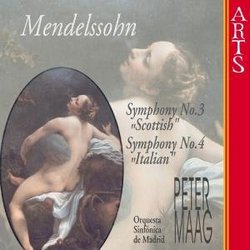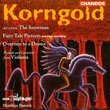| All Artists: Felix [1] Mendelssohn, Peter Maag, Orquesta Sinfónica de Madrid Title: Mendelssohn: Symphonies Nos. 3 & 4 Members Wishing: 0 Total Copies: 0 Label: Arts Music Release Date: 5/19/1998 Genre: Classical Style: Symphonies Number of Discs: 1 SwapaCD Credits: 1 UPC: 600554750620 |
Search - Felix [1] Mendelssohn, Peter Maag, Orquesta Sinfónica de Madrid :: Mendelssohn: Symphonies Nos. 3 & 4
 | Felix [1] Mendelssohn, Peter Maag, Orquesta Sinfónica de Madrid Mendelssohn: Symphonies Nos. 3 & 4 Genre: Classical
|
Larger Image |
CD DetailsSimilar CDs |
CD ReviewsMaag's final statement on the Scottish Andrew R. Weiss | Raleigh, NC USA | 01/28/2009 (5 out of 5 stars) "Just as Beethoven's 9th was the touchstone work for Wilhelm Furtwangler and Beethoven's Eroica was for Otto Klemperer, Mendelssohn's Symphony #3, the "Scottish", was for Peter Maag. He recorded the work at least three times, and his initial recording, with the London Symphony in the early 1960's, is still considered by most to be the standard against which all other performances are to be judged. Maag recorded the work again in the 1970's with the Berne orchestra, and then, in 1997, with the Madrid Symphony (the recording under consideration here). The Berne recording comes from that uncomfortable period when Maag seemed to be aping the worst of the German romantic style: instrumental attacks are smoothed over, textures are uniform, tempi are slow, phrasing is glossy. The result is soporific.
In contrast, this late recording is right up there with the old London Symphony version, albeit from a different perspective. While the London Symphony recording is notable for the plasticity of its phrasing, its dynamism, its spontaneity and its magical atmosphere of color and shade, this recording presents a more somber, dramatic work. The first movement is positively grim and stormy, reminiscent of Maag's early recording of the "Hebrides" overture. The second movement is suitably buoyant, although missing some of the fairy-quality of the 1960's version. The third movement is gorgeous, lyrical, intimate, resigned and serene -- a little faster than the 1960 version, and not quite as passionate, but in many ways more beautiful. In the finale, Maag's initial tempo is a bit slower than usual, in keeping with his serious view of the piece, but it works brilliantly when we come to the coda. Here Maag takes a quicker-than-usual tempo and avoids both the abruptness of the coda and the resulting bombast that infects most performances (including his other ones). For once I heard joy and exaltation and the coda became the capstone to the piece rather than a seeming afterthought. In general, Maag sets out to convince us that this is a more serious piece of music than we normally think it to be, with more emotional depth and resonance, and, to me, he succeeds. This recording does not displace the 1960's version in my collection, but it is worthy to stand alongside it as an equally convincing, if different, perspective. The Italian symphony is a bravura performance and shows more contrast between the movements than I've heard before. The first is about what we'd expect, joyous and frothy. The second has clear contrasts of dark and shade, pointellism and lyricism, and the third is taken at a true minuet tempo, harkening back to Mozart. The finale spins its saltarello but here again Maag finds some more serious emotion, a bit of storm, under the surface. I've heard countless performances of this piece and this is the first to give me an entirely new perspective and an increased respect for the careful artistry and subtlety of the work. Maag clearly lavished rehearsal time and attention to these recordings. Phrasing throughout is precise, detailed and subtle, dynamics are well-judged. The orchestra generally acquits itself well, although the relative thinness of the strings, the occasionally botched intonation and the occasional too-careful playing reveals the Madrid Symphony as somewhat less than a "Class A" international orchestra. Generally, however, the Madrid manages to convey Maag's intentions clearly enough to make the performances well worth listening to again and again. Art's sonics continue to be a mystery to me. On very sophisticated equipment the orchestra sounds natural, instrumental timbres are clean and balanced, hall ambiance is nicely rendered, and the sound is generally warm, spacious and subtle. On less sophisticated equipment, especially those geared toward a more "digital", bright sound, it is far too forward, with harshness in the strings and brass and very prominent tympani. In sum: with the right equipment you will hear truly beautiful, heartfelt recordings of two marvelous symphonies, rendered with more depth and feeling than I've heard from any other conductor. Highly recommended." |

 Track Listings (8) - Disc #1
Track Listings (8) - Disc #1